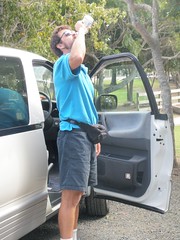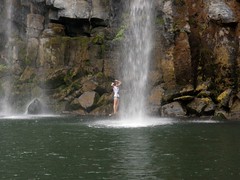Boat life taught many lessons in conservation, so I often wrote about how we could do more with less. Returning to land life in New Zealand has been a lesson in humility; It is ever so much harder to use less when surrounded in abundance. As I continue this series, I revisit the original posts with an eye towards applying boat lessons to land life.
In January 2008, I noodled on how to use less water. This seems a particularly good place to start our effort to translate boat lessons in conservation to land life as the North Island of New Zealand experienced a particularly severe drought this summer. In fact, many here say it is the driest summer and fall since World War II. Farmers are selling their cattle, their land, and their homes as the entire north country dries out. Roads are cracking and fields browning all around us. Late April brought some relief in the form of a series of squalls, but the papers tell us this rain is too little too late for many Kiwi ranchers.
For the Conger clan, however, clean potable water is everywhere. We are virtually swimming in opportunities to profligately pour it down the drain. We don't have to make it, water is super cheap at the tap and of excellent quality, and the country seems to lack the basic infrastructure and social capital to conserve this precious resource. Even in the midst of drought, fountains splash and fixtures leak in every public venue. Conserving water has never really been a high priority in traditionally wet New Zealand; It will take some time before they become accustomed to the notion that "water water everywhere" does not equal "endlessly renewable resource."
Our own contributions to water conservation at Chicken House are very modest and largely economically motivated. While water is not expensive, it is also not free. And as with so many of the resource lessons hard won on Don Quixote, we don't want to lose our good habits. So, here is what we are focusing on:
Dirt is Good - We remain diligent on the subject of dirt and poor personal hygiene. We like it. Look it up… bathing less frequently is actually good for your hair and skin as well as the environment. Pre-boat, we bathed daily -- showers in the morning for the adults, sometimes shared but always taken. Baths in the evenings for the children, always shared, sometimes really loud. On the boat, we'd go weeks... okay, that was probably gross. Back in civilization once more, we bathe twice a week. We make an exception for family members who complete a hard, sweaty workout which, among other things, provides additional incentive to exercise.
Don't Substitute - Don't use water to solve some other problem. For example, if the driveway is dirty, don't wash it down with a hose, sweep it. For us, the seduction is heat. The hot water heater in Chicken House is so hot, so deliciously gloriously hot, that it is tempting to shower daily, bathe nightly, soak in the kitchen sink and roll around in the washing machine. Heat is good. Recognizing that the passion for cleanliness is merely a misguided attempt to thaw out, we've redirected our attentions to other, cheaper and less resource intensive ways to stay warm. Fleece. I have a lot to say about fleece.
Fix Stuff - Everything in this country leaks. Certainly, everything in Chicken House leaks. We are slowly making our way through all the plumbing in an attempt to reduce the volume of lost water. I encourage every reader to do the same in their own home or apartment. It is truly astonishing the amount of water lost by households due to simple leaks in faucets, toilets, and outdoor fittings. We also make a point of reporting every leaky toilet and sink we come across. I don't know that this personal campaign of ours will have any immediate impact, but we have to start somewhere. I'm almost ready to go vigilante on the sinks at the park across the street.
Need Less - Of course, we continue to be parsimonious with water usage for laundry, dishes, household cleaning, and yard work. As with so many conservation "techniques", using less is really a question of getting your head around the fact that you need less. An example that comes to mind is our kitchen sink. We could fill it twice to the brim to do the dishes -- once to wash and once to rinse. However, unless we've dirtied every dish in the house, we need only fill it about a third or halfway to accomplish the same task. The rinse water also does double duty as all the water needed to wipe down the counters.
Reuse - The previous example also demonstrates the "reuse" principle so profoundly important in the "reduce, reuse, recycle, renew" mantra. Few people do a good job of reuse of water, but there are easy ways to pour once, use twice with your water. In particular, bath water is basically an endless source of goodness as long as you don't let the kids wash their hair in it. Without all that added soap, the water can be used that evening or the next day for mopping, cleaning, presoaking laundry, and watering plants. It's just sitting there in the bath, ready to be scooped up.
* * *
I can't honestly say we're consuming anything like the incredibly low volume of 20 gallons a day which was our norm on Don Quixote. However, I do think we are probably maintaining at least half the consumption of the typical household… and hopefully less. Now if you'll excuse me, I'll just go do the dishes to thaw out my fingers.
In January 2008, I noodled on how to use less water. This seems a particularly good place to start our effort to translate boat lessons in conservation to land life as the North Island of New Zealand experienced a particularly severe drought this summer. In fact, many here say it is the driest summer and fall since World War II. Farmers are selling their cattle, their land, and their homes as the entire north country dries out. Roads are cracking and fields browning all around us. Late April brought some relief in the form of a series of squalls, but the papers tell us this rain is too little too late for many Kiwi ranchers.
For the Conger clan, however, clean potable water is everywhere. We are virtually swimming in opportunities to profligately pour it down the drain. We don't have to make it, water is super cheap at the tap and of excellent quality, and the country seems to lack the basic infrastructure and social capital to conserve this precious resource. Even in the midst of drought, fountains splash and fixtures leak in every public venue. Conserving water has never really been a high priority in traditionally wet New Zealand; It will take some time before they become accustomed to the notion that "water water everywhere" does not equal "endlessly renewable resource."
Our own contributions to water conservation at Chicken House are very modest and largely economically motivated. While water is not expensive, it is also not free. And as with so many of the resource lessons hard won on Don Quixote, we don't want to lose our good habits. So, here is what we are focusing on:
Dirt is Good - We remain diligent on the subject of dirt and poor personal hygiene. We like it. Look it up… bathing less frequently is actually good for your hair and skin as well as the environment. Pre-boat, we bathed daily -- showers in the morning for the adults, sometimes shared but always taken. Baths in the evenings for the children, always shared, sometimes really loud. On the boat, we'd go weeks... okay, that was probably gross. Back in civilization once more, we bathe twice a week. We make an exception for family members who complete a hard, sweaty workout which, among other things, provides additional incentive to exercise.
Don't Substitute - Don't use water to solve some other problem. For example, if the driveway is dirty, don't wash it down with a hose, sweep it. For us, the seduction is heat. The hot water heater in Chicken House is so hot, so deliciously gloriously hot, that it is tempting to shower daily, bathe nightly, soak in the kitchen sink and roll around in the washing machine. Heat is good. Recognizing that the passion for cleanliness is merely a misguided attempt to thaw out, we've redirected our attentions to other, cheaper and less resource intensive ways to stay warm. Fleece. I have a lot to say about fleece.
Fix Stuff - Everything in this country leaks. Certainly, everything in Chicken House leaks. We are slowly making our way through all the plumbing in an attempt to reduce the volume of lost water. I encourage every reader to do the same in their own home or apartment. It is truly astonishing the amount of water lost by households due to simple leaks in faucets, toilets, and outdoor fittings. We also make a point of reporting every leaky toilet and sink we come across. I don't know that this personal campaign of ours will have any immediate impact, but we have to start somewhere. I'm almost ready to go vigilante on the sinks at the park across the street.
Need Less - Of course, we continue to be parsimonious with water usage for laundry, dishes, household cleaning, and yard work. As with so many conservation "techniques", using less is really a question of getting your head around the fact that you need less. An example that comes to mind is our kitchen sink. We could fill it twice to the brim to do the dishes -- once to wash and once to rinse. However, unless we've dirtied every dish in the house, we need only fill it about a third or halfway to accomplish the same task. The rinse water also does double duty as all the water needed to wipe down the counters.
Reuse - The previous example also demonstrates the "reuse" principle so profoundly important in the "reduce, reuse, recycle, renew" mantra. Few people do a good job of reuse of water, but there are easy ways to pour once, use twice with your water. In particular, bath water is basically an endless source of goodness as long as you don't let the kids wash their hair in it. Without all that added soap, the water can be used that evening or the next day for mopping, cleaning, presoaking laundry, and watering plants. It's just sitting there in the bath, ready to be scooped up.
* * *
I can't honestly say we're consuming anything like the incredibly low volume of 20 gallons a day which was our norm on Don Quixote. However, I do think we are probably maintaining at least half the consumption of the typical household… and hopefully less. Now if you'll excuse me, I'll just go do the dishes to thaw out my fingers.

